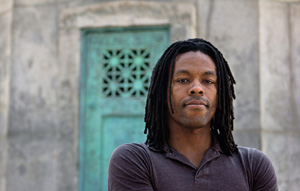Caring activist
While at UNT, Jaron Benjamin was able to bring a wide range of groups together to
agree on the same issue. Now he lobbies political officials for the homeless and those
with HIV/AIDS as vice president of community mobilization and national advocacy for
Housing Works in New York City,
March 7, 2016
 Jaron Benjamin's job is to make connections.
Jaron Benjamin's job is to make connections.
While at UNT, he was able to bring a wide range of groups together to agree on the same issue. Now he lobbies political officials for the homeless and those with HIV/AIDS as vice president of community mobilization and national advocacy for Housing Works in New York City, which is convincing jurisdictions to take steps to end the AIDS/HIV epidemic by 2025 in the U.S. and 2030 in the world.
Housing Works is a healing community of people living with and affected by HIV/AIDS. Their mission is to end the dual crises of homelessness and AIDS through advocacy, the provision of lifesaving services, and entrepreneurial businesses to help sustain their efforts.
Benjamin had always been an activist, inspired by his parents' work in Dallas. He attended UNT from 1998 to 2003. In his last year on campus, a local bar was presenting the creator of the "Girls Gone Wild" series.
Benjamin, who was a leader in Men Against Violence and Student Advocate Volunteer Educators, led the protest that brought together members of the Baptist Student Ministry and Feminist Majority Alliance.
"As long as you're talking to people like people, you can find common ground," he says.
Benjamin first studied political science, then general studies, at UNT. He worked for several organizations in Texas before moving to New York City in 2008.
Find out more
Read a feature story on Careers with a Cause.
He first worked for the Housing Network, where he organized homeless people with HIV and AIDS and lobbied government officials for fair housing and assistance.
He then worked as executive director of the Met Council on Housing, a tenants' rights organization. One of the services it offers is a hotline that tenants with housing issues can call to learn how to solve the problem.
"We really worked hard to turn people from needing assistance to being active," Benjamin says. "Not only do you get your help from the hotline, but you're also in the position of power."
It can be a stressful job. But Benjamin remembers what he learned years ago, when he wanted to quit after a housing law he had fought for had been vetoed.
"You're still inspired by the people. You don't want to quit," he says. "You don't want to give up on them because they don't want to give up."